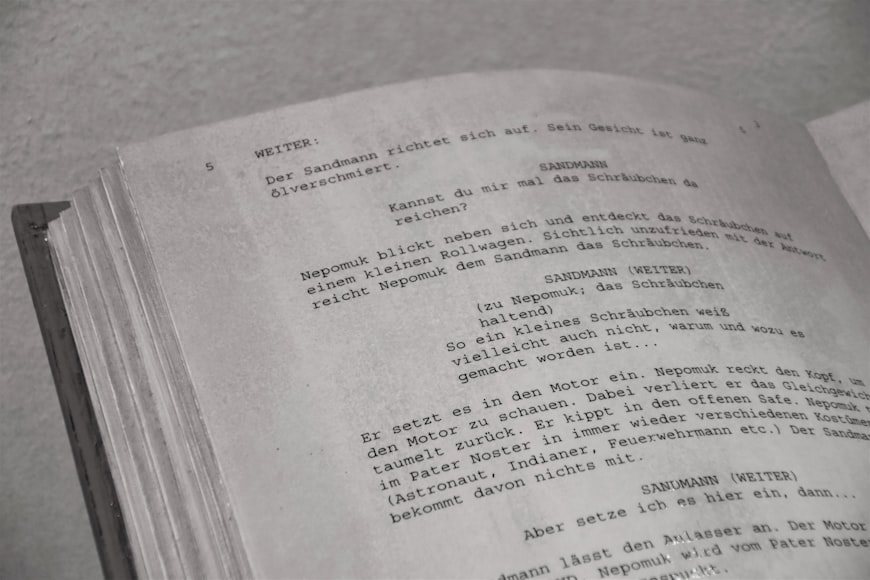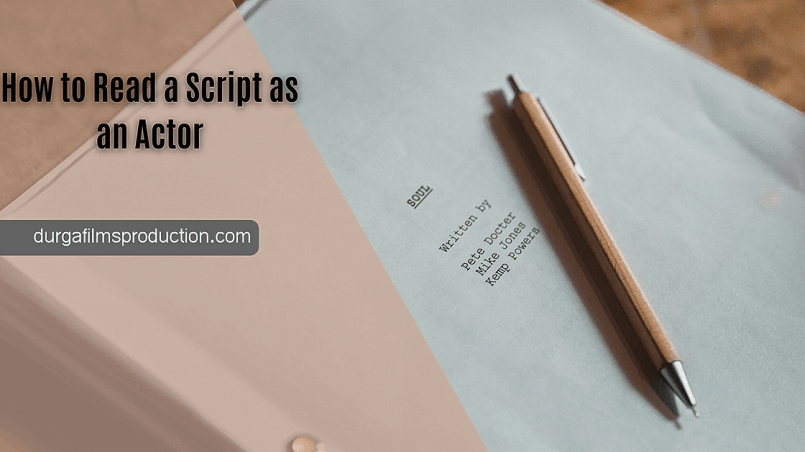So, Today we’re going to talk about reading scripts and how actors can do it. Reviewing the screenplay as a whole is the best way to fully understand the story, including the ideas and tone. Read the scenes again to identify distinct beats and see how the role of your character changes. Last, keep this in mind when you read your lines to improve how you say them.

If you have a script or audition material, you might wonder what other performers do to get ready for a show. How are scripts performed by actors? Reviewing the screenplay as a whole is the best way to fully understand the story, including the ideas and tone.
Read the scenes again to identify distinct beats and see how the role of your character changes. To make delivery more natural, keep that concept in mind as you speak only your syllables. Actors can read the script at each level more than once to make sure they understand it.
Now that you know what they are, let’s talk about the three main steps. In the end, there will be even more advice.
Some steps actors should follow when reading a script
Jump To:
- Read the scenes
- Where do you get the beats
- Try to find a different beat
- Read the whole script
- Read your character’s lines.
- Conclusion
- Question and Answers
Read the scenes

To get a feel for the characters’ rhythms and roles. To start, what is a beat? With each beat, the tone or level of stress of the situation changes. For example, when a jokey conversation turns serious or when flirting turns dangerous. It changes the mood of the place. A “beat” is just a change in the scene’s intensity, tone, connection, or mood. It doesn’t have to be silent.
Where do you get the beats?
You need to learn how to look into things. Power dynamics, relationships, trust issues, feelings, and other things should be taken into account. That changes from the start to the finish of each scene (or screenplay). Once you know what that means, you can move on to the next step.
Find the place in the story where that change happens.
It can happen in the middle of a line, at the end of a line, after someone has spoken, or after something has been done. When that point comes up in the story, that’s the beat.
Try to find a different beat

Here are the things that make a professional actor stand out from the rest: After you’ve done Steps 1 and 2, you should start over and try to find a different beat. What if there is a different change in feeling, connection, etc. from the beginning to the end of the same scenario? Where did that also happen?
How can someone use this to get ahead as an actor?
Because an actor’s take on a beat might be very different from what the director or writer had in mind. The real actor finds parts that they are really interested in. But they can also relate to, watch, and understand how someone else can look at the same situation and find new beats in it. The actor works on being flexible so that he or she doesn’t get stuck in one interpretation. This is done by finding other rhythms.
You might be able to get by if you only know your own role’s beats, but great actors understand the whole script. This is because recognizing beats in other parts of the script will help them understand the story more fully.
A good actor must first understand the screenplay as a whole before they can understand each part (scene and beat) and figure out what their character will do in that scene section. In this case, “role” does not mean the character you are playing. In this case, “role” means what your character does in a certain segment.
For example, your character could be the bad guy in one scene and a good friend in another. Your character’s role may change as the story goes on. So, once you have a general idea of the story, you can focus on figuring out the different roles your character will play in each chapter.
Read the whole script
What is the point of reading a screenplay in the first place? This needs to be made clear. Those who don’t act on stage will pick up a book or screenplay to take them on an adventure (in other words, to get involved in a story).
Scripts are often read out loud by some people as if they were books, just for fun.
Actors look at scripts with a different kind of mind, one that is more interested in understanding than in being amused.
Read your character’s lines.

But keep the rest in mind. You have read a number of books already. You’ve read the whole script and know what it’s about. You have also gone over each segment to make sure you understand the beats and the roles your characters play. It’s time to start learning your lines for every possible situation.
A common mistake made by beginning actors is to start by reading their characters’ lines. Without fully understanding the plot or the importance of the moment, they will try to figure out the best way to deliver them. This is where bad acting happens, because, once again, if you don’t know the topic or tone, all you’re doing is guessing.
When an actor tries to fake his or her emotions (like when they cry, get upset, get angry, play a bad guy, etc.), it is always obvious. This boring performance is usually caused by the audience not understanding the story and its different parts because they haven’t read the whole work.
Conclusion

The search for anger, tears, etc. Once you’ve put in all the hard work (reading the script several times, trying to understand and notice different things each time), it’s easy to understand them. Still, they are sincere about wanting to learn.
Question And Answer
To fully get the whole narrative, including the ideas and tone, read the script in its entirety first. Read the scenes again to identify distinct beats and observe how the role of your character changes. Finally, to make the delivery more natural, keep that concept in mind as you read only your lines.
Before filming begins, actors hardly ever memorise the entire script. As the filming progresses, they become familiar with the text and gradually memorise each section of the script. Keep in mind that actors must read the script several times before beginning a rehearsal.
You only get one chance to read the script aloud for the first time, so keep that in mind. This makes your initial response a priceless moment, which is why taking notes is so crucial. After that, you can use your notes to improve your performance
Read the scenes
Where do you get the beats
Try to find a different beat
Read the whole script
Read your character’s lines.
Conclusion
Question and Answers


